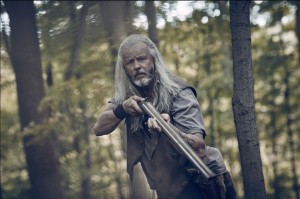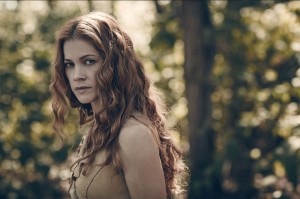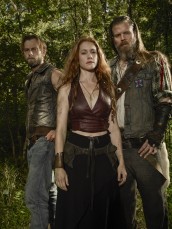
David Morse as Big Foster in OUTSIDERS | © 2016 WGN America
WGN America’s OUTSIDERS ended its first season last year with the isolated mountain Farrell clan of Kentucky confronting an armed contingent of law enforcement from the world below. Also, Big Foster Farrell (David Morse) had apparently been killed by his son Asa (Joe Anderson). Big Foster’s young apparent widow G’winveer (Gillian Alexy) was set to inherit his position as leader of the community.
Season 2 begins Tuesday, January 24, with an apparent clash between the Farrells and the law, but the outcome may not be what we expect. Peter Mattei, who created OUTSIDERS, previews what is to come.
ASSIGNMENT X: With the giant melee that opens Season 2, did you and your fellow executive producer/show runner Peter Tolan have a discussion of, “We’re going to cheat the audience if we don’t do that, but on the other hand, we don’t want what the plot’s going to turn into if we really do that”?
PETER MATTEI: We wanted to tease the audience and give them something of what you think was going to happen, but you’re absolutely right. If that had actually happened, we’d have a very different show.
AX: It seems like a fair percentage of the main characters have some sort of mystical or prophetic vision. Are we meant to believe that something magical is actually happening, or is there something in the area that’s causing even some of the town dwellers to experience this?
MATTEI: Well, we’ve always played that there’s a bit of a supernatural element to that mountain, and you can interpret it in different ways. It could just be people’s sort of waking dreams, or these visions could be very real. We kicked this up a notch in Season 2 from Season 1. So yeah, people see different things. As of now, we don’t have a lot of townspeople having those visions, but we do have a couple coming up.
AX: Wade, the sheriff played by Thomas M. Wright, seems to have visions …
MATTEI: Yeah. He’s more connected to that mountain than anybody else.
AX: Since David Morse is prominent in the ads for Season 2, it’s probably not too spoilery to say that Big Foster is back. In ending Season 1, did you already know how you were going to bring back Big Foster from being shot, or did you think, “Well, we’ll cross that bridge if we get to it”?
MATTEI: Yeah, we knew we were going to bring him back, but we didn’t know how. And we knew we wanted to end his story with a question mark like that. We knew that, all along for the season, Asa was going to “kill” him, and so we just went with that story, but kept it open, so that we could bring him back for Season 2.
AX: Did you ever have a moment of thinking that you might actually kill off Big Foster, or did you just know, “We are not losing David Morse”?
MATTEI: That’s a complicated question, but no, we didn’t want to lose that character. When we first started plotting it out, we didn’t know who the actor was going to be, we didn’t know really what was going on. So at that point, we might have killed him off. But once we were into the season of Season 1, and shooting it and working with David and everything, there was no way we were going to get rid of him. The character, I mean.
AX: Have current events shaped at all your view of what’s going on in the story? You have armed confrontations with the government, plot points about the price of health care. A lot of things seem like they are addressing very specific contemporary issues …
MATTEI: I think I’m a pretty political person, and so when I came up with this idea and wrote the original script, which was several years ago, I think that I was just putting a lot of current politics and conflicts and so on into the story. That’s what interested me about it. The fact that these things have all just gotten much more important and come to a real head – obviously, I couldn’t have anticipated this, but the idea is, a rural part of America where everyone is really desperate and looking for jobs and so on, and you have the Farrells, who are even more impoverished than the unemployed people in the town, and that these two groups are pitted against each other by a coal company and a billionaire class, that kind of thinking, like all the stuff I thought about when I was writing the script, had to do with the economy that exists in this country today, and Occupy Wall Street and the power of the banks, and all these kinds of things. That all went into the story. And so things have just come to more of a head now in our politics. So it’s good. I feel like we were ahead of the curve, and we kind of predicted some things.
The stuff about health care – we’re just trying to be true to the reality of what life is like in a rural place like that. I mean, we’re not wagging our fingers, we’re not speechifying anything about it, but that’s just a reality of life.
AX: This season, we get more of the relationship between Hasil Farrell, played by Kyle Gallner, and townie Sally-Ann, played by Christina Jackson. When you named Hasil “Hasil,” were you thinking of the fact that it’s pronounced “hassle,” as in, “Well, this is a hassle”?
MATTEI: Oh, absolutely not. His namesake is kind of Hasil Adkins, who was a musician/crazy person in West Virginia in the ‘60s and ‘70s and into the ‘80s, and he created – he was a one-man drummer and guitar player, and he created a genre of music that they call psychobilly. I just always loved him and that music, and he influenced a lot of punk rock and a lot of other bands like the Cramps and so on and so forth. He was very influential. So I just named a character after him.

Gillian Alexy as G’Winveer in OUTSIDERS | © 2016 WGN America
AX: With G’Win stepping up as leader, was this something she has always been angling for, or does she see it as a necessity?
MATTEI: Again, I think that’s going to be up to interpretation. That’s part of the questions that people will be asking about her. I think she is a really good leader, but she’s a little torn. She’s a very good person, and I think that maybe it’s harder for a really good person to lead people in a time of crisis than it is for a bad person to have no qualms about anything. So that’s going to be her struggle for the season, how to hold onto her principles and her beliefs and still lead the clan.
AX: Can you talk about the arc for Little Foster, played by Ryan Hurst, this season?
MATTEI: Well, his character goes on a massive journey of transformation over the course of the season. His character really changes and grows and becomes a completely different man. I think people are going to be really, really into the journey of Little Foster this season, and Ryan’s performance.
AX: We also meet a community of women, the Kinnah, from the dark side of the mountain. Were you always planning to bring them at the beginning of Season 2? When you started writing OUTSIDERS, how far did you have mapped out?
MATTEI: When we started Season 1, we had almost nothing mapped out. We mapped out Season 1 as we worked on it. And then we had no idea what Season 2 would be. So when we started working on Season 2, we were like, “Well, let’s bring some new blood into this story from the mountain.” So that’s where that came from.
AX: Should we read anything into the Kinnah leader character played by Louise Barnes calling herself Moregon, since the Morrigan is the three-phased Irish goddess of battle and death?
MATTEI: I did not know that. I just kind of made the name up. I thought it had “mor” in it, so it had death in it as a syllable, like “Mordor” or whatever. We decided that since they were people that kind of left the Farrells early on after coming here [to the mountain], they would have come originally from Ireland, and all the Farrells would have had Irish or Scots or Welsh accents. So we decided to keep Moregon’s accent Irish. She did a British accent in her audition – Louise is from South Africa, I believe, and she’s very adept at accents. So we talked to her about it, and we chose a Northern Irish accent.
AX: Are there any things you’ve learned about the characters or the locations that have affected the way you wrote Season 2?
MATTEI: Yeah, of course. Season 1 was a journey of discovery, figuring out everything there was to figure out about the show – the characters, the actors playing them and what they brought to those characters, everything about set design and music and our locations and what we could get away with and what worked and what didn’t. So Season 2, we had a much better idea, and we were able to write to that stuff.
Like the Kinnah, for example. That wasn’t something that anybody had thought about before Season 2. We realized we wanted to bring new characters in, so we had to create a whole lore around them and a back story around them, for example. What else? I don’t know for sure, but that’s just one example. We thought it was an interesting thing to look at, that there could be an all-female clan, with their own rules, that are really, really strong, that go back to some kind of ancient roots of a matriarchy and stuff like that.
AX: If you ever have all-out war between the Farrells and the outside world, would that be the end of the show, or could OUTSIDERS continue after that kind of a clash?
MATTEI: I think it’s possible that there will be such a clash, I can’t tell you when. And what happens after a war, I mean, I don’t know. There’s always an aftermath. Somebody always survives.
AX: And what would you most like people to know about Season 2 of OUTSIDERS?
MATTEI: I think that I would say that Season 2 of OUTSIDERS is going to be the show on television, more than any other show, that most speaks to the Trump times that we live in.
This interview was conducted during WGN’s portion of the January 2017 Television Critics Association press tour in Pasadena, California.
Follow us on Twitter at ASSIGNMENT X
Like us on Facebook at ASSIGNMENT X
Article Source: Assignment X
Article: OUTSIDERS: Peter Mattei creator previews Season 2 – exclusive interview
Related Posts:











